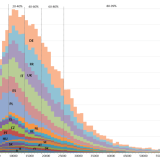
Välfungerande och inkluderande arbetsmarknader
Välfungerande arbetsmarknader är en förutsättning för att man ska kunna dra full nytta av den sysselsättningsskapande potentialen hos ekonomin på väg upp ur den finansiella och ekonomiska krisen. Krisen har fått mycket olika konsekvenser för arbetsmarknaderna i de olika EU-medlemsstaterna, och vissa grupper, som unga och lågutbildade, har drabbats särskilt hårt. Den snabba strukturella omvandling som pågår innebär också nya utmaningar i form av möjlig brist på arbetskraft och svårigheter att matcha kompetenser i olika sektorer och regioner.
EU:s främsta verktyg för att främja sysselsättning och social inkludering är Europeiska socialfonden, som hjälper människor att få jobb, integrerar missgynnade grupper i samhället och främjar rättvisare livsmöjligheter för alla. Det finns också omfattande EU-lagstiftning som reglerar arbetstagarnas rättigheter på arbetsmarknaden. I april 2017 lanserade kommissionen den europeiska pelaren för sociala rättigheter. Pelaren bygger på och kompletterar EU:s socialpolitik och sysselsättningspolitik för att styra politiken inom en rad områden som är centrala för välfungerande och rättvisa arbetsmarknader och välfärdssystem.
- Europeiska kommissionen: Europeiska socialfonden
- Europeiska kommissionen: En europeisk pelare för sociala rättigheter




























